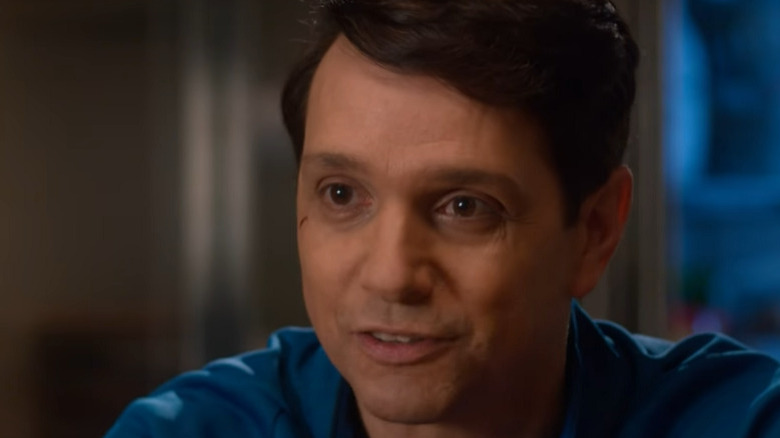The Iconic Karate Kid Reference You Missed In Cobra Kai Season 4 Episode 5
"Cobra Kai" has had a lot of fun playing with the established canon of the Miyagi-verse — the creators own name for the first four "Karate Kid" films. The very 1980s-set Karate Kid series definitely had its cheesy moments, but it also dealt in serious drama. It's so much the same with "Cobra Kai," which even manages to find ways to resurrect the original's now-retro '80s soundtrack of synthesizers and power ballads. This is a show that can pull off full-on training montages and, thanks to careful shooting and scoring, make the audience take them seriously.
For every ultra-serious callback to Johnny Lawrence (William Zabka) and Daniel LaRusso's (Ralph Macchio) teenage rivalry, there's a joke about the styles, music, and movies that were popular back in the '80s. In their own ways, Johnny and Daniel are stuck back in the decade that made them. So is their taste in music. Just take this fun reference from the fifth episode of Season 4.
Miguel learned about Peter Cetera during Season 4 of Cobra Kai
During Episode 5, "Match Point," Miguel learns about the existence of iconic '80s balladeer Peter Cetera. The singer's skills are brought up briefly, but it's enough of a nod to amuse the audience and fans of all things Miyagi-verse.
Peter Cetera, of course, had a number one hit on the Billboard Charts with "Glory of Love," the love theme from "The Karate Kid Part II," in 1986. The song held onto the number one slot for two weeks in a row. Cetera, who is perhaps best known for leading the band Chicago back in the late 1970s and early 1980s, also had a fairly decent string of hits in the mid-to-late 1980s and early 1990s. His duet with Christian pop songstress Amy Grant, "The Next Time I Fall," was a number one hit in 1986, and his duet with Cher, "After All," made it to number six on the chart in 1989.
All in all, a worthy lesson for young Miguel, and a great callback to the source material.

